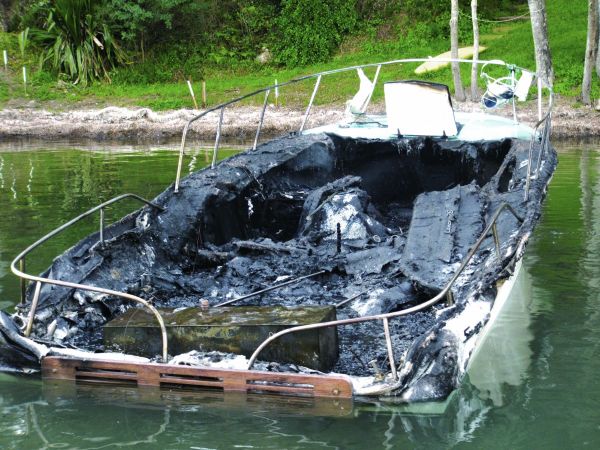What to do if there's a fire on a vessel
How to prevent and respond to fires on boats and other vessels. Watch out for fuel leaks and have a safety plan in place.
Fire on board
A fire on board a vessel can spread rapidly, generate intense heat and cause explosions. Fuel spills and gas leaks can cause fires. A fire can also happen immediately after refuelling.

What to do
If a fire starts on your vessel:
- Warn passengers and make a distress call on your marine radio.
- Shut off fuel lines and gas lines immediately.
- Try to put out the fire using your bucket and fire extinguisher.
- If a burning object can be safely moved, throw it into the water quickly.
- Close all hatches, vents and ports to reduce oxygen.
- Remove LPG cylinders from the heat source. If this is not possible, spray water on cylinders to keep them cool. If flames are threatening to engulf a gas cylinder, you should abandon the vessel.
- Manoeuvre the vessel downwind.
- Keep a close watch on the area once the fire is out.
Abandoning your vessel
If you have to abandon a vessel with a fire on board, do not move the vessel towards another vessel.
Abandon your vessel on the windward side – the side the wind is blowing from – in case the vessel drifts and spreads fuel in the water. Make sure everyone is wearing a lifejacket.
Helping another vessel with a fire
Give what help you can, depending on your knowledge and experience. Keep to the windward side of the vessel. Your first responsibility is to your passengers and vessel.
Reduce the risk
- Have a fire drill and practise it regularly on board.
- Make sure you have an approved fire extinguisher for the type of fuel you have on board. Do not store it close to the stove or engine compartment.
- Do not store combustible materials in the bilge or engine compartment.
- Check the electrical system for faults and keep all components clean.
- Take care when using fuel stoves and lamps.
- Take care when refuelling.
- Do not fill fuel caddies in your vessel – always fill them on shore.
- Keep engine compartments ventilated, especially on hot days and when refuelling.
- Use a blower or ventilation system before starting the engine or operating any electrical equipment.
- Clean up fuel spills quickly.
- Make sure any LPG cylinders and appliances are firmly secured and away from draughts. Get them serviced by a licensed gasfitter.
- Make sure LPG cylinders and appliances are suitable for marine use.
- Maintain your engine, check for fuel leaks and service your vessel regularly.